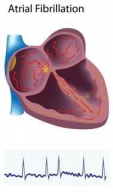MAZE: Building a Path in the Heart
to Fix Atrial Fibrillation
Medically Reviewed by S. Cary Huber, MD
A temporary fluttering in the chest. An extra or skipped beat. This is something that almost everyone has experienced. It’s usually nothing but could be a sign of something more serious.
THE PROBLEM
Think of the heart like a machine that requires electrical impulses to travel through it in a certain path to keep blood pumping regularly. When the impulses don’t travel in the correct path, the heart’s chambers (2 upper atriums, 2 lower ventricles) don’t expand and contract in a coordinated manner. A rapid beating in the upper chambers prevents the heart from pumping blood adequately to the lower chambers. At times the heart may beat too fast or too slowly.
The patient feels their heart skipping or fluttering – often accompanied by shortness of breath, chest pain, dizziness, fainting and extreme fatigue.
About one in four men and women over age 40 can be expected to have Atrial Fibrillation (AF) some time in their lives. Some people don’t even notice when their heart goes into AF. Many of those who are troubled by AF can be controlled with medication. But about half of the patients will require some type of additional therapy.
BUILDING THE MAZE
“MAZE is a surgical procedure, where the surgeon uses a probe to create lesions in the heart tissue, without damaging the heart,” says McLeod Cardiothoracic Surgeon Dr. S. Cary Huber. “The scar tissue blocks the wandering electrical impulses, creating a maze-like path in the heart that redirects the electrical flow. MAZE cures AF by interrupting the electrical patterns that are responsible for the irregular heartbeat.”
MAZE can be performed as a minimally invasive standalone procedure, but is often one element of a broader open-heart operation.
The patient may be placed on a blood thinner, such as Coumadin for about 3 months, after surgery, to prevent AF as the impulses learn their new routes through the heart.
ACTION YOU CAN TAKE
The heart and vascular system can present a wide range of problems due to disease and aging. On the other hand, new medications and procedures are being developed all the time. Don’t wait. Check with your personal physician for a checkup or referrals to a board-certified, experienced cardiologist and cardiac surgeon.
Find a cardiothoracic surgeon near you.
Sources include: McLeod Health, National Institutes of Health, American Heart Association, Transparency Market Research, Society of Thoracic Surgeons, Journal of Thoracic & Cardiovascular Surgery, American Institute of Physics
-
McLEOD REGIONAL MEDICAL CENTER FLORENCE
843-777-2000 -
McLEOD DARLINGTON
843-777-1100 -
McLEOD DILLON
843-774-4111 -
McLEOD LORIS
843-716-7000 -
McLEOD SEACOAST
843-390-8100 -
McLEOD CHERAW
843-537-7881 -
McLEOD CLARENDON
803-433-3000



-
McLEOD REGIONAL MEDICAL CENTER FLORENCE
843-777-2000 -
McLEOD DARLINGTON
843-777-1100 -
McLEOD DILLON
843-774-4111 -
McLEOD LORIS
843-716-7000 -
McLEOD SEACOAST
843-390-8100 -
McLEOD CHERAW
843-537-7881 -
McLEOD CLARENDON
803-433-3000
 Find a Doctor
Find a Doctor  Locations
Locations  Services
Services 